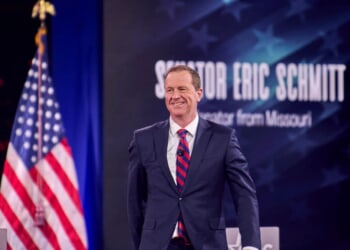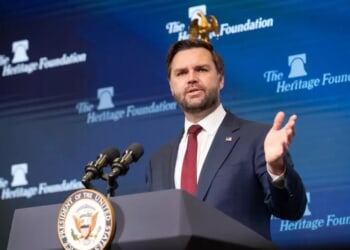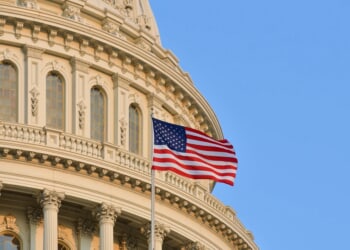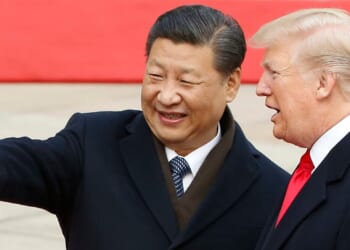President Donald Trump wants the U.S. to lead the world on artificial intelligence. He showed just how firm his commitment to this goal is when he announced the launch of the Stargate AI project on January 22; the project is backed by Open AI CEO Sam Altman, Softbank CEO Masayoshi Son, and Oracle Founder Larry Ellison.
Stargate seeks to jumpstart the development of artificial intelligence infrastructure in the United States, particularly through AI data centers. Stargate is launching with an initial private capital investment of $100 billion and is expected to raise another $400 billion over the next four years. It is projected to create 100,000 jobs in the United States and lessen U.S. dependence on China.
Trump’s announcement was swiftly followed on January 23 with an executive order on artificial intelligence titled “Removing Barriers to American Leadership in Artificial Intelligence.” This order directs several presidential advisers to develop an “AI action plan” within 180 days.
Trump has argued that America must take the lead on AI because we would become vulnerable if we fall behind China or other international competitors. In February, Trump warned that the rise of China’s DeepSeek AI technology “should be a wake-up call for our industries that we need to be laser-focused on competing.”

Subscribe to The American Spectator to receive our latest print edition.
Although the Stargate project has faced some backlash — including from Elon Musk, who claimed Stargate’s partners “don’t actually have the money” for the $500 billion initiative — the project has motivated other world leaders to make major investments in AI. For example, French President Emmanuel Macron announced that his country would make a $114 billion investment at the AI Summit in Paris in February — an amount that he noted is proportionately comparable to the United States’ $500 billion commitment.
Unfortunately, the mainstream media has sought to undercut Trump’s bold embrace of AI by propagating the false narrative that the president is deliberately ignoring AI’s inherent risks. Even before Trump was elected, Wired magazine proclaimed, “A Trump Win Could Unleash Dangerous AI.” It stated: “Donald Trump’s opposition to ‘woke’ safety standards for artificial intelligence would likely mean the dismantling of regulations that protect Americans from misinformation, discrimination, and worse.”
More recently, the media has been particularly critical of Trump’s decision to repeal former President Joe Biden’s October 2023 executive order “Safe Secure and Trustworthy Development and Use of Artificial Intelligence.” This order put the onus on federal government agencies to develop AI safety standards, evaluate AI model biases, and conduct broader risk assessments on AI.
Some media outlets have also called out Trump’s repeal of the AI policy directive, which required government agencies using artificial intelligence to demonstrate that they are not “harming the public.” Time, for instance, offered the following critique:
The new actions threaten to erase some of the Biden administration’s efforts — championed by then-Vice President Kamala Harris — to curb government use of the kinds of AI tools that have been found to unfairly discriminate based on race, gender or disability, from medical diagnosis chatbots spouting false information to face recognition technology tied to wrongful arrests of Black men.
Even as liberals back home have criticized Trump’s effort to decrease regulations on AI, Trump’s commitment to U.S. leadership in the artificial intelligence space has been met with envy in Europe. The London-based policy institute Chatham House noted that U.S.-based companies are able to circumvent the copious regulations that European companies are subject to under Brussels’ new rules on digital services. Christian Miele, a partner at a venture capital firm that invests in a French AI company, called Trump’s investments “more than a wake-up call; this is a slap in our face” in an interview with Politico Europe.
Trump’s AI policies were spotlighted on the world stage during Vice President JD Vance’s speech at the Paris Summit on Artificial Intelligence. During his remarks at the February 11 summit, Vance spoke out against the dangers of excessive regulation of artificial intelligence. He stated:
Now, just because we’re the leader [on AI] doesn’t mean we want to or need to go it alone, of course. And let me be emphatic about this point. America wants to partner with all of you, and we want to embark on the AI revolution before us with the spirit of openness and collaboration. But to create that kind of trust, we need international regulatory regimes that foster the creation of AI technology rather than strangle it. And we need our European friends in particular to look to this new frontier with optimism rather than trepidation.
As the vice president so eloquently conveyed, innovation always involves risk, but that risk is not mitigated by fearmongering and excessive regulation. Shackling AI technology with burdensome rules would only give the advantage to China and other authoritarian regimes. Additionally, it would shut out innovative U.S. startups that would not be able to compete against larger players with more financial resources.
Artificial intelligence is the next revolutionary technology, and no global power is better positioned to lead this revolution than the U.S. under President Donald Trump. The world’s next technological golden age has arrived.
Subscribe to The American Spectator to receive our spring 2025 print magazine.


![NYC Tourist Helicopter Falls into Hudson River, Siemens Executive and Family Among Those Killed [WATCH]](https://www.right2024.com/wp-content/uploads/2025/04/NYC-Tourist-Helicopter-Falls-into-Hudson-River-Siemens-Executive-and-350x250.jpg)







![Green Day’s Cringe Trump Diss Ends in Fire and Evacuation [WATCH]](https://www.right2024.com/wp-content/uploads/2025/04/Green-Days-Cringe-Trump-Diss-Ends-in-Fire-and-Evacuation-350x250.jpg)
![Trump’s White House Trolls Illegal Alien Gangs With Hilariously Brutal Video [WATCH]](https://www.right2024.com/wp-content/uploads/2025/03/1742261427_Trumps-White-House-Trolls-Illegal-Alien-Gangs-With-Hilariously-Brutal-350x250.jpg)





